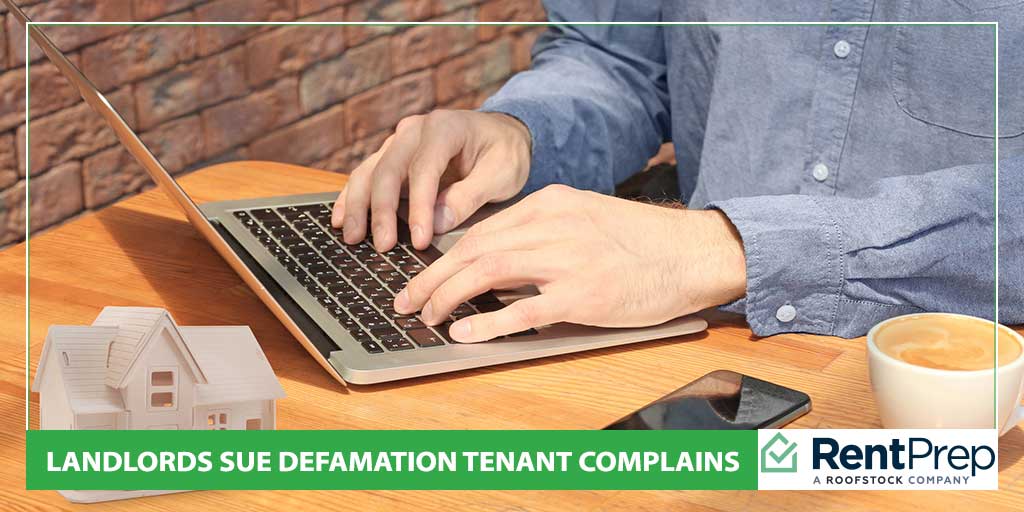
Updated March 2021
The rise of social media has made it easier than ever for tenants to broadcast their opinions about a landlord or property management company – and it has made it harder than ever for landlords to scrub negative opinions or outright falsehoods connected to their names.
Should landlords sue for defamation over tenant complaints or is that just seen as an acceptable part of the real estate business now?
Not surprisingly, the number of defamation cases between landlords and tenants has increased along with the popularity of online review sites and social media channels.
Laws regarding defamation vary from state to state, but most landlords will find that suing is not going to be the most productive option. Today, think more about what you can do when tenant complaints are taking hold – and when you should consider legal action.
Table Of Contents On What To Do About Tenant Complaints
When tenant complaints start appearing, it can cause a fight or flight reaction in landlords who are unprepared for dealing with online commentary or social media. What should you do when facing this type of situation, when all you really wanted to do was manage rental properties? Here’s what you need to know and learn to address.
- When A Tenant Starts To Complain …
- 4 Steps To Take If Your Tenant Is Complaining About You Online
- The Pros And Cons Of Public Opinion
- An Overview Of Defamation
- Should Landlords Consider Defamation Cases?
- Tenant Slandering Landlord Cases
- Future For Landlord-Tenant Defamation Suits
- Keep Your Focus On What’s Important
When A Tenant Starts To Complain…

Whether you manage a rent-stabilized rental unit or a few standalone family homes, it is possible for tenants to become upset about something and begin to air their grievances online. It’s okay and expected for people to share their opinions online, but some tenants will take it above and beyond just their personal opinions.
There is a difference between sharing frustrations with an audience online and trying to weaponize that audience to effect changes. When a tenant begins to do the latter, it is important for you to take swift action to address your landlord-tenant relationship and any existing rifts to minimize the damage.
4 Steps To Take If Your Tenant Is Complaining About You Online
A tenant is talking about your business online, and they’re not saying anything pleasant. In fact, they’re exaggerating, telling stories you don’t agree with, and spreading other news that feels completely inaccurate. What exactly should you do to handle this situation?
Let’s break it down into three simple steps to help address this issue as cleanly and clearly as possible.
Step #1: Talk To Your Tenant Directly
The best thing you can do when you hear from your tenant, property manager, or another individual that your tenant is posting negative things about you online is to talk to them. It may feel awkward or uncomfortable, but it is important to find out exactly what your tenant believes you are doing wrong.
With this information in hand, you’ll be better prepared to address the situation.
Step #2: Review The Lease Agreement
Once you have determined what your tenant is upset about, you can take time to review the lease agreement you both signed. Have you broken the lease agreement or is your tenant expecting you to bend the rules to what they believe is right? Take time to carefully review the terms with an unbiased view to determine where the difference in perspective comes from.
States require you to follow certain rules, and those rules can change from time-to-time. Give your tenant the benefit of the doubt and double-check that you have done everything to code. There’s always a chance that you have made an honest mistake, and you can easily rectify that mistake if you have.
Step #3: Address The Issue
Regardless of whether you are correct or incorrect, go back to your tenant with the information gathered from local laws and the lease agreement to clarify your position. With luck, you and your tenant will be able to talk out the issue and come to an agreeable resolution.
Once you have done so, you can also politely request that your tenant share an update on the situation. Even if you are not completely amicable, tenants should be willing to concede that you were willing to hear them out and address their concerns as best you could given the rules and lease agreement.
If they will not update their online review, you can consider making a PR statement about your position as a company. This is certainly not required, but it may be an advisable choice if you are receiving a large amount of backlash for not addressing the tenant’s concerns. While you don’t need to share specifics, it can be helpful to clarify that you are aware and working with the tenant.
Step 4: Remember: Not Everyone Will Like You
When dealing with this type of situation, it is important to remember that your goal is to remedy the situation with your tenant and any local institutions that you rely on for business. Your goal cannot be to make everyone like you.
It is a simple fact that not everyone in the world is going to like you, and that’s okay! The point is that rational people will be able to see that you have not done any malicious harm in your business and that you will continue to run your business honestly.
As long as you can help to get that point across, everything will be OK.
The Pros And Cons Of Public Opinion
When it comes to working with rental real estate, many landlords will say that you simply need to get used to bad tenants asking surprising questions online. Just take a look at some of the top tenant searches on Google:
- How to get your landlord in trouble?
- Can I sue my landlord for false accusations?
- Can I sue my landlord for defamation of character?
While it’s illegal for a landlord to commit actual slander or defamation, many tenants are exaggerating when they ask these questions.
As it becomes more and more common to talk about personal problems in online public forums, the attitude towards how things should be handled is changing as well. Sites specifically for reviewing landlords have even been created, and these can be either a boon or a hindrance.
Remember: everything has pros and cons. Just as frustrating tenants might write some not-so-good things about you, understanding tenants will talk about where you excel.
Do your best to be a fair and honest landlord who communicates things openly and clearly with their tenants. There will be disagreements from time to time. If you are good to your tenants, however, you will always have a solid business backbone to build off.
An Overview Of Defamation

Broadly speaking, “defamation” includes any false written or oral statement that injures a third party’s reputation. Defamation is typically broken down into two categories: libel, or written statements, and slander, or spoken statements.
To win a case for defamation against a tenant, a landlord or property manager must be able to show that:
- The tenant made a false statement of material fact,
- The statement was “published,” or made to some third party,
- The tenant knew or should have known the statement was untrue, and
- The landlord suffered some actual harm as a result of the statement.
The key on which many defamation suits turn is the false statement of material fact. The statement at issue must be both (a) stated as a fact and (b) false. If it is true, a defamation claim will not survive; likewise, if it is understood to be an opinion, sarcasm, or exaggeration, a defamation claim will not survive.
Should Landlords Consider Defamation Cases?
Most of the time, landlords won’t sue for defamation because of tenant complaints online. The high cost of real estate attorney fees and the limitations of state laws makes it a risky choice. Plus, the amount of time it takes to win a court case could be better spent on solidifying and building your business.
In some cases, however, landlords have suffered serious financial loss and emotional distress because of the actions of a tenant. You can read more about actual cases of tenant slandering a landlord below.
Tenant Slandering Landlord
The following court cases are helpful in determining the rights of a landlord in situations where a tenant slanders the landlord.
Horizon Group Management v. Bonnen: “Mere Opinion”
Courts in many states have only recently begun fielding defamation cases based on internet comments in any significant numbers.
One prominent early case was Horizon Group Management v. Bonnen, in which the landlord, Horizon, filed a defamation case against former tenant Amanda Bonnen on the basis of a message Bonnen posted to her Twitter account in response to another Twitter user.
The message read, in part, “Who said sleeping in a moldy apartment was bad for you? Horizon realty thinks it’s ok.”
Horizon argued that the message, which could be read by any member of the public who happened across Bonnen’s Twitter page, harmed the company’s “reputation as a landlord in Chicago.”
The court, however, disagreed and dismissed the complaint with prejudice, finding that the content of the message couldn’t reliably be categorized as a false statement of fact – it could also be read as an opinion or as a sarcastic comment.
Bently Reserve L.P. v. Papaliolios: “Factual Assertions”
Although the Bonnen court dismissed the case before it for lack of “factual assertions,” the court in Bently Reserve, L.P. v. Papaliolios took a different track.
The landlord managed the Jones Building on San Francisco’s Nob Hill, where Papaliolios was a tenant for several years. In 2012, Papaliolios left a review on the building’s Yelp page, stating, among other things, that “the new owners’ noise, intrusions, and other abhorrent behaviors (likely) contributed to the death of three tenants (Pat, Mary, & John) and the departure of eight more…. They have sought evictions of 6 of those long-term tenants, even though rent was paid-in-full, and those tenants bothered nobody.”
Far from seeing these statements as opinion, sarcasm, or exaggeration, the court allowed the case to proceed, stating that “Papaliolios’ review, in part, is susceptible to being read as containing factual assertions, not just mere opinion….”
Future For Landlord-Tenant Defamation Suits
The law of defamation as it applies to internet reviews is still developing, and it changes rapidly. Nevertheless, landlords can take this part of the Papaliolios court’s opinion to heart: “While many Internet critiques are nothing more than ranting opinions that cannot be taken seriously, Internet commentary does not ipso facto get a free pass under defamation law.”
Keep Your Focus On What’s Important
When it comes to a tenant slandering a landlord online, you need to think about what matters most. Being falsely accused is never fun, and people joining in online can feel paramount to landlord harassment in some cases.
What you do with the situation, however, will determine how things proceed. Remember what you should do:
- Talk to the tenant directly, if possible, and as soon as possible
- Review the lease agreement and local laws to determine the best course of action
- Address the tenants complains, even if you won’t make any changes, directly
- Ask the tenant to amend their statements online or make your own, if necessary
The key to surviving any negative online attention is to remember that your business exists in the material world, not just online. Even if you have to deal with some negative energy online due to a frustrated tenant that you cannot help any further, you still have a business to grow.
Focus on being the best landlord you can be, and you will be able to continue in the rental business with ease. Rational tenants will continue to see you for what you are: an honest businessperson.
Moving forward, protect your business and reputation by making sure to choose the best possible tenants. Improve your tenant screening process with background checks, credit reports, and more from RentPrep.
Note: This article is provided for informational purposes only. No information provided in this article should be considered legal advice. If you have legal questions, please consult an attorney who is licensed to practice law in your area. For legal advice online, check out RocketLawyerAdvice.com.

